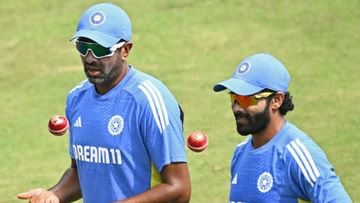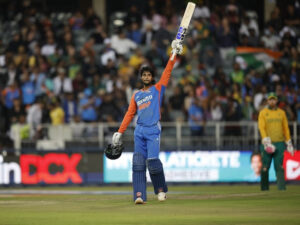
“They’re Allowed to Have Some Bad Games: Rohit Sharma Defends Ashwin and Jadeja After Pune Test Loss – But Is This the Right Approach?”
Cricket is a sport of precision, teamwork, and intense scrutiny, especially in a cricket-loving nation like India. When a team like India, which has had stellar performances, faces a setback like the one in the Pune Test, fingers inevitably get pointed. Fans and pundits question what went wrong, and players find themselves under a microscope. In the aftermath of India’s disappointing performance, captain Rohit Sharma’s defense of senior players Ravichandran Ashwin and Ravindra Jadeja sparked both support and controversy. Sharma’s assertion that “They’re allowed to have some bad games” in reference to these two veterans has ignited a fierce debate. While loyalty to players is commendable, is the lack of accountability really beneficial to Indian cricket?
The Context: Pune Test Loss and the Indian Team’s Struggles
India’s loss in Pune was not only disappointing but also highlighted a series of recurring issues in the team’s approach to the game. Ravichandran Ashwin and Ravindra Jadeja, hailed as two of India’s premier spinners and seasoned all-rounders, failed to deliver in critical moments. Their subpar performance had a cascading effect on the team’s morale and strategy, leading to a defeat that fans and analysts feel could have been avoided.
Rohit Sharma, in the face of immense media criticism, responded by defending Ashwin and Jadeja. He argued that these stalwarts are entitled to have an “off day” and shouldn’t be judged solely based on a single performance. This statement, while intended to quell criticism, has sparked mixed reactions. Some view it as a show of trust in the players, while others see it as shielding underperforming stars from rightful accountability.
Loyalty or Lethargy? The Case for Accountability
There’s no doubt that Rohit Sharma’s loyalty to his teammates is admirable. In an era where quick fixes are often prioritized over long-term growth, Sharma’s approach may seem refreshing. However, loyalty should never undermine accountability. This notion of “they’re allowed to have bad games” may resonate with sportsmanship but may not align with the ethos of winning in a fiercely competitive landscape.
Ashwin and Jadeja are not rookies; they are experienced players with high expectations from fans and management alike. Their places in the playing XI are not guaranteed – they are based on performance. A “bad game” might be acceptable for a younger, less experienced player. But for seniors whose performances are critical to India’s success, repeated underwhelming showings raise serious questions. Excusing poor performances too readily may risk creating a sense of complacency within the team.
Setting a Precedent: What Kind of Message Is Being Sent?
Rohit’s defense of Ashwin and Jadeja also sets a precedent. By softening the impact of failure for senior players, Sharma inadvertently sends a message that performance standards are flexible, depending on one’s status in the team. This runs counter to the very idea of meritocracy, which is crucial in sports. Players should be motivated to excel and understand that their place in the squad depends on consistent performance.
Moreover, younger players watching these developments may interpret the defense of Ashwin and Jadeja as preferential treatment. For someone just making their way into the team, this could be a disheartening signal – that established players are beyond reproach, regardless of their performance.
Fans and Experts Divided: A Nation Obsessed with Cricket Weighs In
The Indian fanbase is famously passionate and quick to react. Fans who have followed Indian cricket for years know the significance of Ashwin and Jadeja’s roles. But they are also conscious of the team’s need to continuously adapt and improve, especially on the international stage. Social media reactions reflect a stark divide; while some fans stand by Sharma’s remarks, others are critical, calling for a stronger emphasis on performance rather than reputation.
Cricket analysts and former players have also voiced their opinions. Some believe that Rohit’s defense of Ashwin and Jadeja is necessary to maintain team harmony and morale, especially given the media’s tendency to amplify failures. However, others argue that such defenses can stifle competition within the team and prevent promising talent from getting a fair chance. In a sport where career spans are short and opportunities scarce, performance-based selections should be prioritized over allegiance.
Balancing Support and Standards
Rohit Sharma’s approach reflects a delicate balance – showing faith in experienced players while ensuring the team maintains high standards. But in defending Ashwin and Jadeja too readily, there’s a risk of undermining this balance. Sharma, as captain, is not only a teammate but also a leader tasked with making hard decisions for the betterment of the team. This includes holding senior players accountable.
Indian cricket’s history shows that change is sometimes necessary for growth. Think of legends like Sachin Tendulkar and Rahul Dravid, who were never immune to criticism or self-evaluation. Their ability to face criticism and strive for improvement is what made them legends. The same holds true for Ashwin and Jadeja, who should be encouraged to rise above recent failures rather than being insulated from criticism.
Moving Forward: A Hard Look at Team Dynamics
The Pune Test loss should serve as a moment of introspection, not just for the players but for the entire management. The focus should shift towards understanding where the team’s weaknesses lie and addressing them rather than providing blanket defenses. Senior players like Ashwin and Jadeja undoubtedly bring experience and skill, but complacency or leniency cannot replace accountability.
Indian cricket fans and analysts alike hope that Sharma’s comments aren’t indicative of a long-term culture of shielding players from criticism. After all, the strength of Indian cricket lies in its competitive spirit and its refusal to accept mediocrity, regardless of a player’s history.
Final Thoughts: The Fine Line Between Support and Complacency
Rohit Sharma’s defense of Ashwin and Jadeja might have been well-intentioned, but it opens the door to a broader conversation. Indian cricket cannot afford to rest on the laurels of past performances, especially in an era where competition is fiercer than ever. There is no doubt that Ashwin and Jadeja are world-class players, but shielding them from accountability does a disservice to them, to the team, and to the sport itself.
In the end, perhaps Sharma’s loyalty is indeed admirable, but it should not come at the expense of accountability. If Indian cricket wants to sustain its legacy and continue to inspire millions, then every player – no matter how established – must be held to the highest standard. Only then can Indian cricket truly thrive, beyond the excuse of “a bad game.”






